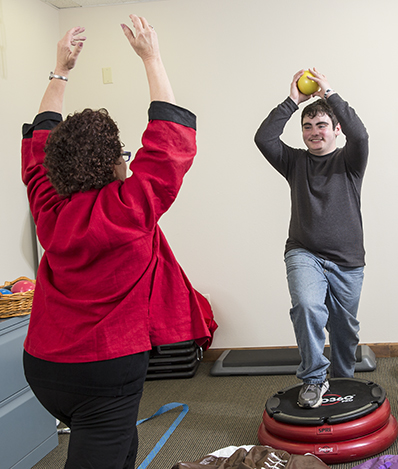GET STARTED
Get started with a no-cost, over-the-phone information session by completing the New Client Inquiry Form.
For questions or additional information, contact our Treatment Center at treatment@sensoryhealth.org or by calling us at 303-221-7827.
A growing body of scientific research suggests that the human brain remains capable of change and adaptation at any age. What this means for adults and older children with Disordered Sensory Processing (SPD) is that they, too, can benefit from intervention for their sensory challenges.
If you or an adult you know experience any of the following problems, occupational therapy intervention may be able to help:
- Emotionally reactive to situations or events that seem overwhelming, and/or having difficulty identifying why you are upset or what caused you to react
- Difficulties with balance
- Trouble sitting still
- Poor attention and focus
- Disorganization
- Accident-prone, clumsiness
- Poor coordination
- Difficulty tolerating strong lights, smells, or sounds
- Uncomfortable with physical touch from others (hugging, cuddling)
- Problems tolerating clothing, bathing, grooming, dentists or doctors
- Poor posture
- Overwhelmed by shopping at stores or malls
- Problems with driving or parking
- Limited decision making and problem solving skills
- Overwhelmed by crowds
- Fear of heights, elevators, escalators, and/or stairs
- Problems with relationships or socializing related to any of the above issues
What Does Treatment Look Like?
Effective services for adults and older adolescents include direct therapy, home programs, education, and/or accommodations. Many adults do well with evaluation and consultation for treatment. We do not put adults into the same equipment we use with children, but we provide the consultation they need to treat themselves. Often we can prepare a home program using some equipment such as Interactive Metronome at home, Integrated Listening Systems at home, proprioceptive activities (resistive weight bearing) and other activities designed to raise the adult’s threshold to sensation and normalize his/her reactions.
In direct treatment, therapy improves sensory processing and decreases sensory symptoms. Specific sensory inputs such as tactile stimulation, movement, auditory input, and/or other sensory experiences are utilized to normalize the client’s specific symptoms.
Adults who have never before experienced heights, touch, or movement with comfort can become much more successful and happy during those activities.
Home programs can be utilized, with some limited direct treatment, to assist with reducing the negative symptoms associated with differences in Sensory Integration and Processing. Education about sensory processing and the sensory systems can contribute to personal insight into how one’s own sensory processing differences affect learning, relationships, and social participation. This understanding lays a foundation so that the adult can develop accommodations to sensory-based differences, which modifies the negative impact of SPD on the adult’s daily life.
Adults may be parents of children with differences in Sensory Integration & Processing or maybe older individuals who have never had relationship and sensory-based intervention.
What to Expect from your Occupational Therapy Evaluation
Our Experience
Since we opened the STAR Institute’s Adolescent and Adult Program, we have seen a number of adults who were never appropriately diagnosed or treated as children. These individuals have lived life as best they could, but never felt “normal.” They have done their best and in some ways have been able to achieve success professionally. For example, several have been physicians, lawyers and engineers. Others have found more active service-related jobs such as counseling, social work, or administration of a program. Though their professions have been diverse, what is extraordinary is their lack of fulfillment personally and the sad inability to have fulfilling personal lives. A negative response to touch and sound in particular and sometimes a low threshold to vestibular sensation (discomfort with movement/fear of heights) has resulted in atypical personal relationships and a lack of joy in spontaneous life. Their life partners complain of anger issues, dissatisfaction with the individuals’ capacity to empathize and understand others while not understanding the adults’ need for space.
This is often due to “fight or flight” responses in the adult, which are misinterpreted by others. Through a combination of activities designed to raise the person’s sensory threshold and psychoeducation, many adults can achieve peace and fulfillment.
Sensation and emotion are irretrievably linked, thus most adults with significant sensory issues also have developed coping strategies which include emotionally aberrant behaviors. This might include withdrawing from certain situations and people, or in some cases aggression when they are challenged. We have exceptionally well-trained psychologists on staff who specialize in adults with sensory and emotional challenges. These psychologists can help adults understand their own behavior and can help couples deal with the fallout of responses to sensory input which are atypical and affect the emotional system.

